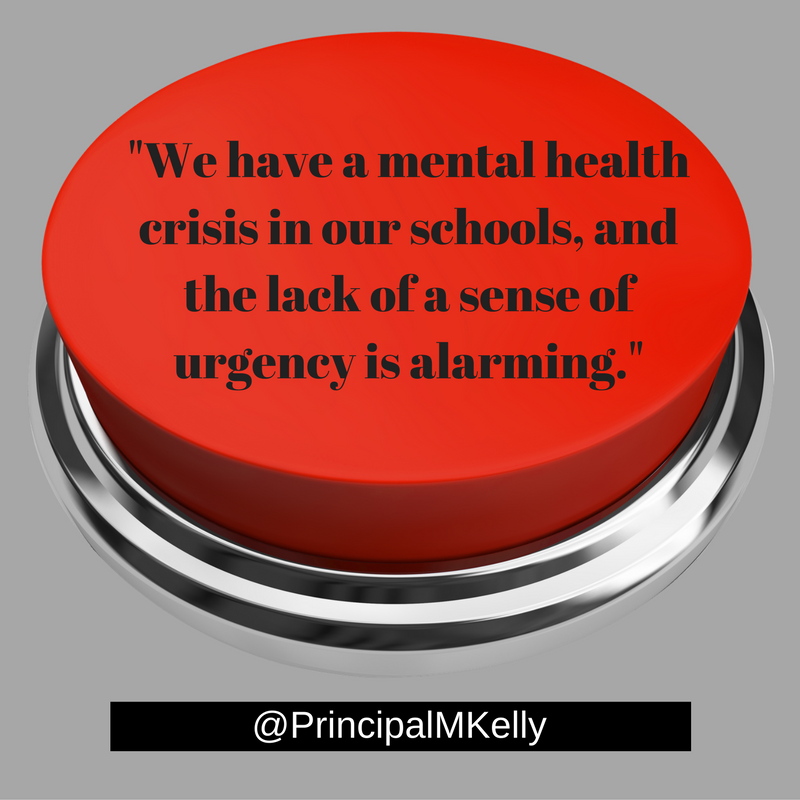
We have a mental health crisis in our schools, and the lack of a sense of urgency is alarming. Anderson and Cardoza (2016) report “Up to one in five kids living in the U.S. shows signs or symptoms of a mental health disorder in a given year.” Despite these growing numbers, discussion about this crisis in education has been comparatively mute. Tons of focus within education has been focused on technology. Logan (n.d.) reports that 20% of schools who responded to one survey indicated they had a 1:1 device/technology program. While Blad (2016) cites a Civil Rights data report stating anywhere between 13-20% of schools do not have a school counselor. Minority children being the least likely to attend schools without a counselor. But educators don’t need research to tell them we are in crisis. Teachers and administrators have seen this crisis unfold before their eyes. It’s in their classrooms, offices, hallways; it’s everywhere.
So why aren’t politicians, school boards and educational leaders addressing this crisis the way they should? Where is the sense of urgency? It is possible that discussing mental health is still a taboo subject for some school districts. We may be fearful of admitting we have a problem for which we are ill-equipped to handle. Maybe it’s that promoting mental health needs doesn’t make for an exciting school board presentation, or school promotion on Twitter or Facebook. Or possibly, dedicating funds and implementing programs for mental health aren’t as flashy as buying new computers, or setting up a new Makerspace. Whatever it is, the lack of response is unacceptable. A large number of students are not getting the counseling and therapy they need to meet their needs. Without this support, making academic growth really isn’t an option.
Educators and parents need to take action now. If OUR students, OUR children, are not getting the help they need outside of school, we must bring supports into school. I am finished debating whether the responsibility for providing mental health services should lie with the school. It doesn’t matter. We cannot sit back and watch this crisis continue to grow. We must be transparent about the problem, and communicate our needs at every opportunity. We must speak up in district meetings. We must contact our legislators, departments of education, school boards, and district leadership and demand they make this a priority.
 At the very least, every school should have at least one school psychologist, guidance counselor, and social worker. Every school should provide individual and group mental health services/therapy. We must find funding and ways to provide these supports. We can partner with local agencies and organizations to bring programs and supports into our schools. Some may be able to provide free services, but some may come at a cost. However, if one of the main goals of our schools, is to create a safe and supportive environment; if we are truly aimed at serving students and meeting their needs; Then schools need to prioritize these items in their focus and budget. We find money for what we value. Let’s make sure we value the most basic needs of our students first.
At the very least, every school should have at least one school psychologist, guidance counselor, and social worker. Every school should provide individual and group mental health services/therapy. We must find funding and ways to provide these supports. We can partner with local agencies and organizations to bring programs and supports into our schools. Some may be able to provide free services, but some may come at a cost. However, if one of the main goals of our schools, is to create a safe and supportive environment; if we are truly aimed at serving students and meeting their needs; Then schools need to prioritize these items in their focus and budget. We find money for what we value. Let’s make sure we value the most basic needs of our students first.
The investment we make in the mental health needs of our students will not only benefit those students we serve in this capacity, but our society as a whole. It is our duty to improve the way we view and support mental health needs. Addressing these needs at a younger age will result in improved academic, behavioral and long-term outcomes for our children, and our society. This is a call to action!
What is your school doing to meet the mental health needs of its students? What can our education system do better?
References
Anderson, M., & Cardoza, K. (2016, August 31). Mental Health In Schools: A Hidden Crisis Affecting Millions Of Students. Retrieved December 13, 2016, from http://www.npr.org/sections/ed/2016/08/31/464727159/mental-health-in-schools-a-hidden-crisis-affecting-millions-of-students
Blad, E. (2016, December 09). Schools With Police But No School Counselors: A Closer Look. Retrieved December 13, 2016, from http://blogs.edweek.org/edweek/rulesforengagement/2016/12/black_hispanic_students_more_likely_to_attend_schools_with_police_but_no_counselors.html
Children’s Mental Health (Rep.). (n.d.). doi:10.1136/ebmh.10.4.e2
I appreciate your post Mike, and we are seeing students in crisis too. These students need additional support, and also need different things from their teachers. We are finding that traditional classroom management methods are not effective for students in crisis. Would love to hear what you are doing that is working. Thank you for sharing!
LikeLike
We have a school counselor but she is weighed down in paperwork and our school psychologist only is there for testing purposes. However we do have a mental health counselor that comes in to work with a few students. I do agree with you that there needs to be a bigger push and yes I do think that it is still considered by many in charge to be a social faux pas to get mental health help. Sad.
LikeLike